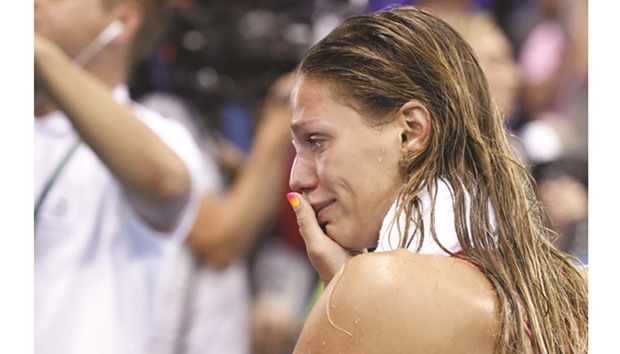In the long history of the Games there couldn’t have been many sadder silver medallists than Yulia Efimova.
It wasn’t the race, or that she finished second. She said herself that it was “the best I can do right now”. It was the fact that winning it meant she finally had to talk to the press. And everything else she has been through too; the boos she has heard every night in the pool, and the blunt opinions expressed by her fellow competitors.
Not least the one who beat her, the USA’s Lilly King, who said over and again that Efimova shouldn’t have been allowed to swim here, and refused to congratulate her after the race was over, because Efimova had twice failed drugs tests. And here’s the thing: King was right to take that stand. Too few in her sport do, least of all the men and women who run it.
Efimova said she was happy, but didn’t seem it. Speaking in faltering English, she said that she couldn’t explain how she felt but that she would ask everyone to “just try to understand me, if you can”. She felt she was being persecuted.
She has been living in the USA for four years, she said, and was only in Russia for “maybe one month a year”. She insisted she had nothing to do with, and knew nothing about, the Russian state-sponsored doping program which was exposed in the McLaren report, and that she was being unfairly persecuted for political reasons.
“In the Olympic Games, usually all wars stop, but now they can’t find a way to beat Russia and now they try to make use of athletes. I would really like to encourage my fellow athletes to understand my problems,” Efimova said, “and not let politics into it. It is very upsetting that some athletes don’t believe that. They watch television, they read newspapers, they have no idea of the facts.”
As confusing as the situation is, it’s still clearer than the sport’s governing body Fina’s thinking. The Russian press reported that Fina actually wrote to CAS to support Efimova in the very case she was bringing against them. Fina declined to comment on that.
They were, however, very keen to talk about Wada’s McLaren report. So keen, in fact, that two days before it had even been released their President, Julio Maglione, put out a statement saying that the report lacked credibility and that he was worried there was “a drive behind the scenes to get a global coalition of support” to “call for the total ban on Russia”. A little later, he added that he felt Wada had “exceeded its powers”.
It wasn’t so long ago—a year and 10 months to the week, if you like to be precise—that Maglione flew to Russia to personally present Vladimir Putin with something called the ‘Fina Order’, which they award “to a head of state or individuals of high dignity who have achieved remarkable merit in the world of aquatics”.
It was a ‘thank you’ for his personal contribution to their sport. Putin’s most notable contribution was that he had Russia host the lavish World Championships in Kazan last year. The very same World Championships, of course, which McLaren revealed had been systematically undermined by Russia’s sports ministry, security forces, and anti-doping agency. Which is what Efimova says she is now being punished for.
Long before those Championships had even started, Fina’s executive director Cornel Marculescu was warned by the World Swimming Coaches Association that “(Rusada) are clearly complicit in the doping of Russian athletes” and “that the legitimacy of the Fina World Championships this summer is at great risk.”
This wasn’t inside information. It was readily available in a German TV documentary that could be seen on YouTube. Marculescu’s response was to promise “that we have excellent working relations with Rusada and we coordinate with them our doping control programme in Russia.” Marculescu and Maglione both agreed that the Kazan Championships were the best there had ever been.
No wonder that Jon Rudd, who coaches former Olympic champion Ruta Meilutyte, said last month that Fina have “lost their way”, that their “credibility and respect could not be any lower”. No wonder that the great Australia coach Bill Sweetenham thinks the doping problem is “as bad as it has ever been”.
Because Efimova isn’t the only one. Like Rudd said, she’s just “the tip of the iceberg”, “a representative of the system that doesn’t work”.
Efimova may be a cheat, but they run the system that has let her compete.
It is Fina’s fault that there have been as many jeers as cheers in the Aquatic Stadium so far this week, so if you really want to know who to boo, it isn’t her, but them.

Russian swimmer Yulia Efimova cries after finishing second in 100m breaststroke
